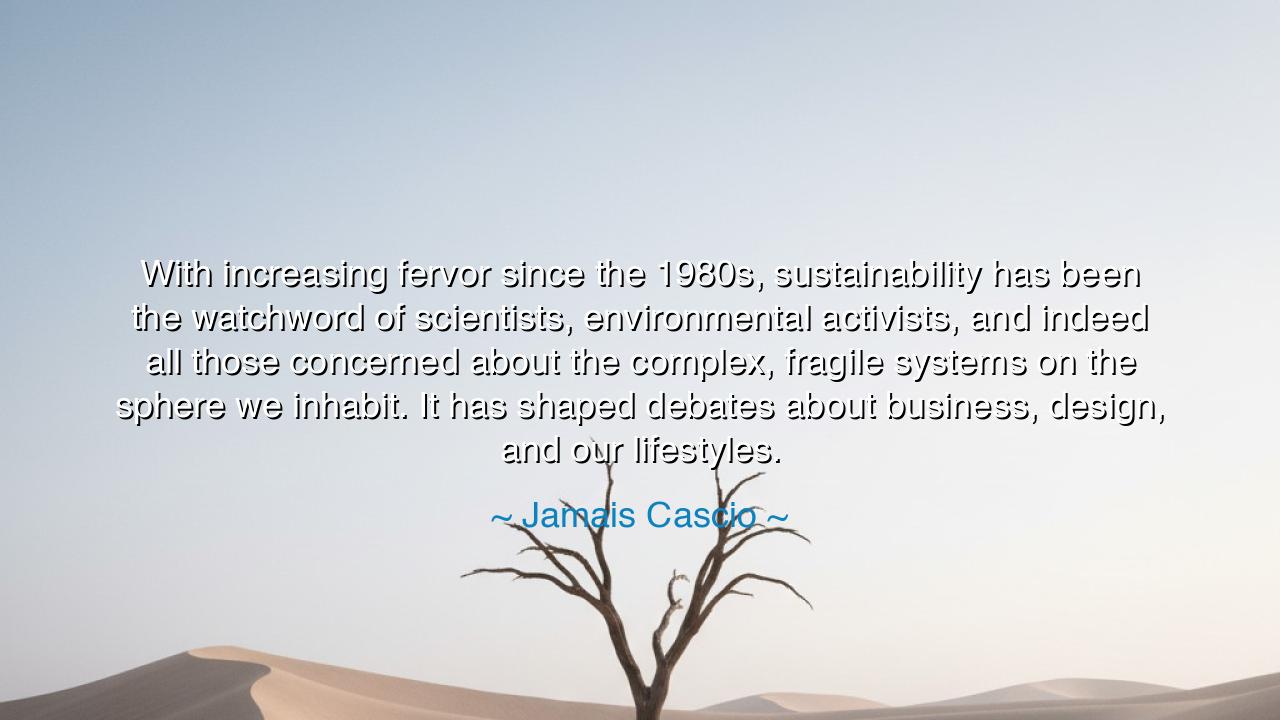
With increasing fervor since the 1980s, sustainability has been
With increasing fervor since the 1980s, sustainability has been the watchword of scientists, environmental activists, and indeed all those concerned about the complex, fragile systems on the sphere we inhabit. It has shaped debates about business, design, and our lifestyles.






“With increasing fervor since the 1980s, sustainability has been the watchword of scientists, environmental activists, and indeed all those concerned about the complex, fragile systems on the sphere we inhabit. It has shaped debates about business, design, and our lifestyles.” So spoke Jamais Cascio, a voice of foresight in an age teetering between creation and collapse. In this reflection, he summons us to remember a sacred truth long known to the ancients: that the Earth is not ours to conquer, but ours to steward. His words are not merely an observation of the times — they are a warning and a calling, a reminder that sustainability is not a trend, but a moral law written in the fabric of life itself.
The 1980s, as Cascio recalls, marked an awakening — the moment when humanity first began to hear the groan of the planet beneath the weight of its own progress. Scientists raised their voices, warning that the balance of nature was faltering; rivers grew foul, forests shrank like dying lungs, and the sky itself began to warm. Yet out of that darkness, a new word began to rise — sustainability — a word as soft as breath, yet as powerful as fire. It was the rediscovery of an old wisdom, ancient as the soil: that no civilization can endure if it consumes more than it gives, if it takes without tending, if it builds without balance.
To understand sustainability is to understand interdependence — that the Earth, the air, the water, and the living things that dwell upon them are all part of one great body. To harm one limb is to wound the whole. This truth was known to the elders of old. The tribes of the Iroquois Confederacy spoke of the “seventh generation” — a principle that taught every decision must honor not only those alive, but those yet unborn. When they felled a tree, they did so with prayer, for they knew that life was not a possession, but a gift held in trust. This is the essence of Cascio’s wisdom: that sustainability is not merely science, but reverence — a spiritual recognition of our place in the web of existence.
Yet, how far we have strayed from this harmony. In our age of industry and consumption, humanity has learned to build empires but forgotten how to belong. We measure progress by the towers we raise, not by the rivers we preserve. We speak of growth, but seldom of balance. Cascio reminds us that even in our modern brilliance — in business, in design, in the rhythms of our lifestyles — we must return to the wisdom of the Earth. For what good is innovation if it devours the ground beneath our feet? What triumph is there in comfort if it steals the breath of our children’s skies?
The story of the Aral Sea stands as a mirror to our folly. Once one of the largest lakes in the world, it nourished life, trade, and culture. But through decades of reckless irrigation and greed, the waters vanished, leaving behind a wasteland of salt and sorrow. Towns that once thrived by the shore now lie buried in dust. The dreams of progress became monuments of desolation. Such is the cost when we forget that the Earth is a living covenant, not a resource without end. The destruction of the Aral Sea is not a tale of the past — it is a warning for the future.
Cascio’s words call us not to despair, but to renewal. For just as destruction is born of ignorance, so too can healing rise from wisdom. We must become designers of harmony — shaping our technologies, our cities, and our ways of living to honor the cycles of nature. Let us plant trees not only for beauty, but for breath. Let us build homes that give back to the land, and economies that nourish rather than consume. Let our fervor be not for profit, but for preservation; not for dominion, but for continuity.
The lesson, then, is this: sustainability is not an idea of the mind, but a covenant of the heart. To live sustainably is to live consciously — to remember that we are but travelers upon this sphere we inhabit, and our journey depends upon its well-being. So act each day as a guardian, not a guest. Choose simplicity over excess, restoration over ruin, mindfulness over haste. For when we live in harmony with the Earth, we do more than preserve it — we preserve the soul of humanity itself. And in that sacred act, we fulfill the hope that Cascio spoke of: that the world, once fragile, might yet be made new.






AAdministratorAdministrator
Welcome, honored guests. Please leave a comment, we will respond soon